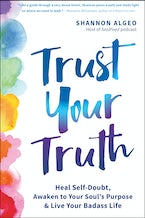By Shannon Algeo, author of Trust Your Truth
Self-doubt is something we all struggle with. For me, I struggle with it daily. Where does it come from? In our society, there are people and companies that benefit from our self-doubt. Whether it’s a diet, or a fitness craze, or a fancy car, or a certain number of social media followers we are supposed to have to look important, the world sends us very clear messages about who we are supposed to be to look good and fit in. We are taught to go striving after something outside of ourselves to bring more meaning and purpose into our lives. Self-doubt is inevitable when we are unconsciously, yet often obsessively, trying to win at someone else’s game. If playing someone else’s game is causing you suffering and depleting your self-worth, you may be ready to create the rules to your own game, and give up trying to meet other people’s expectations as a means to feel worthy and “enough.” While self-doubt is an attempt to meet someone else’s expectations, self-worth is the practice of determining your own expectations for yourself based on what is most important to YOU.
Ask yourself and possibly journal your answer to these questions:
1. What would be possible for my life and purpose if I stepped fully into my confidence?
2. What changes might need to be made in my life if I started showing up authentically in my truth?
Sometimes, doubt can be useful, but we want to be sure we are differentiating between doubting our conditioning versus doubting our soul’s true knowing. If I am reckoning with the ways in which I—as a white man—have been complicit in racist and patriarchal systems, then a healthy amount of doubt can be useful for me to look at that conditioning and reckon with the ways that I have been showing up based on someone else’s version of the truth. In this case, discernment of our thoughts and actions can be helpful. But if I am scared to speak up in a relationship and tell someone how I really feel because I don’t want to upset the other person and am prioritizing putting their needs over my own, it is important for me to recognize that I am withholding my deep soul truth from coming forth into the world.
In Trust Your Truth, I refer to your soul self as your True Self. This is that part of you that accesses greater wisdom and intelligence. This is the part of you that unconsciously knows what you need to thrive—even when you consciously forget. To access your True Self, learn to listen to the messages of the body. Ask yourself, “What is my body communicating to me?” For example, if you have a knot in your gut, you might ask yourself, “What does this knot have to say?” This is what psychotherapist David G. Martin (2016) calls the “experiential-cognitive process,” which guides us to a more holistic experience of ourselves. We can actually allow the experience of the body to inform our cognitive understanding of whatever is coming up for us. When we work with the body to understand its wisdom, we integrate the body and mind into greater harmony, partnership, and union. Start with listening to the messages the body communicates—especially in moments where you feel triggered or that your nervous system is becoming dysregulated. The body will often tell us the truth if we have the courage and wisdom to listen.
Self-doubt dissolves in the presence of your embodied awareness. And yet, there are many parts that make up the whole you. In Trust Your Truth, we journey through the seven chakras—the seven energy centers of the body—to explore the body’s wisdom in each energy center. The chakras allow us to experientially explore what it is like to develop a relationship with each energy center and learn to know and trust yourself more deeply and fully. Whenever you connect to the power of your breath, the sensations in your body, the emotions of the heart, and the discerning intelligence of the mind, you are tapping into multiple different energetic doorways that can lead you into the room of your truth. This deeper connection allows you to make decisions from a place of clarity and self-trust, instead of getting confined and stuck by self-doubt. This also allows you to determine your unique needs as an individual human being separate from the messages, rules, and expectations that society has placed upon you. You can bravely (and even confidently) say, “HELL NO!” to the people, places, and things that are draining your life force energy and say, “HELL YES!” to the things that bring your soul a sense of deep purpose, fulfillment, and meaning.
It takes courage to be ourselves, and so we must show up courageously and consistently as we say no to the societal norms that we have internalized to be true, and say yes to the voice of our own soul. As you learn to integrate the intelligent communications from the body and the wisdom of the seven chakras, you open yourself up to becoming an empowered, clear channel for truth to flow through you. You are the vehicle, the vessel, for inspired energy to flow through. It’s through this awareness and this practice that we become bigger than our small selves, and we connect to a power which is greater than any single one of us. Trusting your truth is a practice, and self-doubt is something that will come up—again and again—throughout our lives. Each time it emerges, this is an opportunity for us to return home to our True Self and practice asking, “What is the next right action that is going to guide me home to being ME—instead of the person others expect me to be?”
Named one of the “35 Under 35 in Wellness to Watch” by Wanderlust, Shannon Algeo is a celebrated speaker, writer, life coach, and Yoga Nidra and meditation teacher. His popular podcast, SoulFeed, features interviews with iconic cultural and spiritual leaders like Deepak Chopra, Caroline Myss, Marianne Williamson, Danielle LaPorte, and many more. In his coaching practice, Algeo works with clients to heal old patterns of trauma so they can show up in the world with power, presence, and purpose.



 2024 Peace Playbook: 3 Tactics to Avoid Clashes with Your Partner
2024 Peace Playbook: 3 Tactics to Avoid Clashes with Your Partner